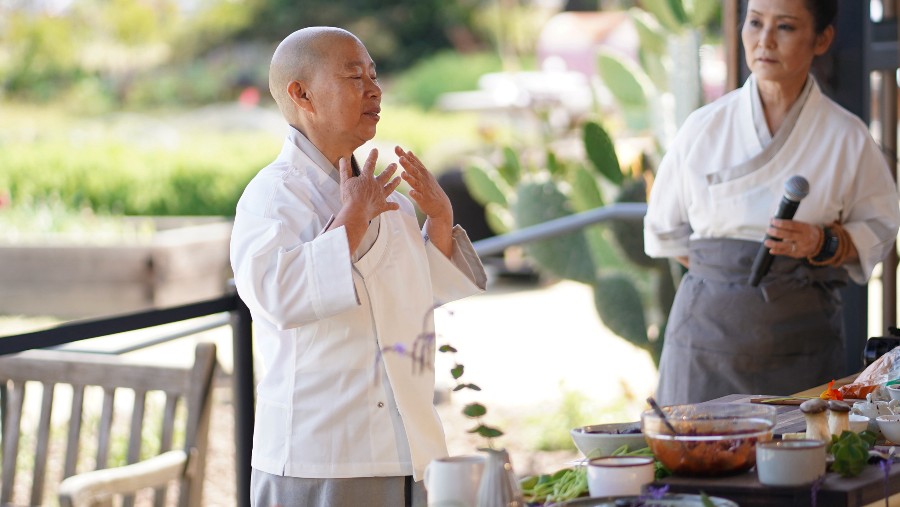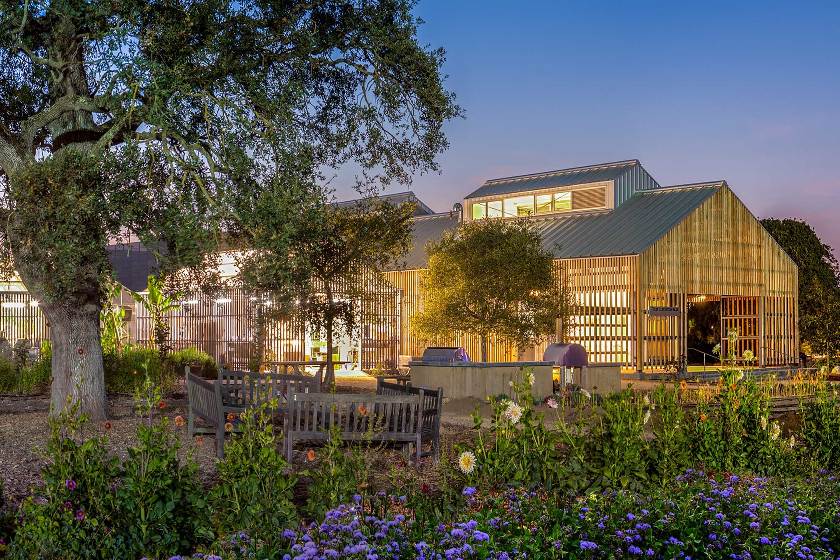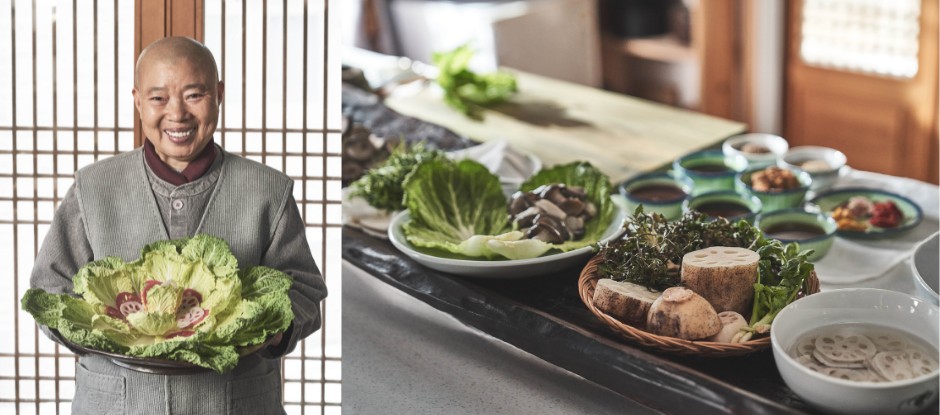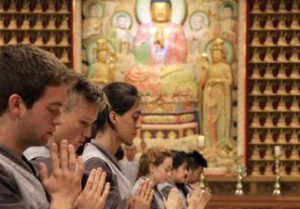
The Venerable Jeong Kwan Seunim visited Stanford University on 2 May to offer a demonstration of Korean temple cuisine. The Seon Buddhist nun shared the monastic love for plant-based foods at an event at the O’Donohue Family Stanford Educational Farm as part of a green future initiative of the Stanford Food Institute (SFI). The demonstration was organized by the SFI as part of its goal of making Stanford dining more sustainable.
The nun is one of the best-known Korean monastics after an episode of the Netflix series “Chef’s Table” featured her in 2017. On the show and in her demonstration this week, Ven. Jeong Kwan blended Korean cuisine with Seon Buddhism. Before she began, she meditated on the interdependence of all living things.
Through her interpreter, Ven. Jeong Kwan led participants through a chant to “prepare our bodies and minds to receive this food” we know ourselves to be “unworthy of,” yet nevertheless receive with gratitude “in pursuit of enlightenment.” Relating her ability to be present and happy even far from her monastery, Ven. Jeong Kwan remarked that she felt “right at home” among Stanford’s abundant green space and architecture. (The Stanford Daily)

Many of her signature tastes draw from the Korean practice of fermenting ingredients for months or years. Her soy sauce, for instance, has been aged for five years. She calls it, “teardrops of the spirit.” (The Stanford Daily)
Ven. Jeong Kwan is the director of Chunjinam Hermitage at Baekyangsa Temple, located on the edge of Naejangsan National Park, 270 kilometers south of Seoul. She has been honing her cooking skills, following strict Buddhist vegetarian guidelines, for more than 40 years. She won the 2022 Icon Award from the “Asia’s 50 Best Restaurants 2022” guide.

As the guide states, “When she joined Baekyangsa Temple at only 17, Jeong Kwan began honing her culinary skills in the temple’s kitchen, cooking for her fellow seunims (Korean Buddhist nuns and monks) and the occasional visitor to the monastery. Cooking soon became the nun’s religious practice, a way to embody and share Buddhist principles and to honour nature and the Earth in the process.” (The World’s 50 Best)
On the way food has connected her with people, she says, “Since those early years, I have also learned the preciousness of sharing meals together with people, and with all beings. In fact, the temple kitchen was and continues to be a classroom that teaches me how to appreciate everything: the world and all beings in the universe.” (South China Morning Post)
Ven. Jeong Kwan teaches that the best cooking for our bodies and most delicious comes from an intimate connection between ingredients. She is a champion of local and seasonal ingredients, as well as a selection of sauces and spices specially made at her monastery. With time and practice, she works to become similarly intimate with each ingredient. ‘‘That is how I make the best use of a cucumber,’’ she explains through a translator. ‘‘Cucumber becomes me. I become cucumber. Because I grow them personally, and I have poured in my energy.’’ She sums up her cooking philosophy in words echoing her Buddhist tradition, ‘‘Let nature take care of it.’’ (The New York Times)
See more
Buddhist Nun Jeong Kwan Seunim teaches Korean temple cuisine at the Farm (The Stanford Daily)
The Buddhist nun spreading the gospel of Korean temple cuisine (The World’s 50 Best)
Korean temple food and how to make it – Netflix star and Buddhist nun Jeong Kwan celebrates its healing powers (South China Morning Post)
Jeong Kwan, the Philosopher Chef (The New York Times)
Related news reports from BDG
Buddhist Nun Publishes English Cookbook on Korean Temple Food
Buddhist Temple in New York Offers Food Lifeline to Nepali Students
Thailand’s Santi Asoke Flourishes by Promoting Simplicity
Related features from BDG
Buddhistdoor View: Strengthening the Tradition of Women’s Leadership in Buddhism
Tam Po Shek and Wing Chi Ip: Refreshing the Soul and the Senses by Playing the Flute and Drinking Tea
United by Our Common Vows: Tenku Ruff on Soto Zen in North America












